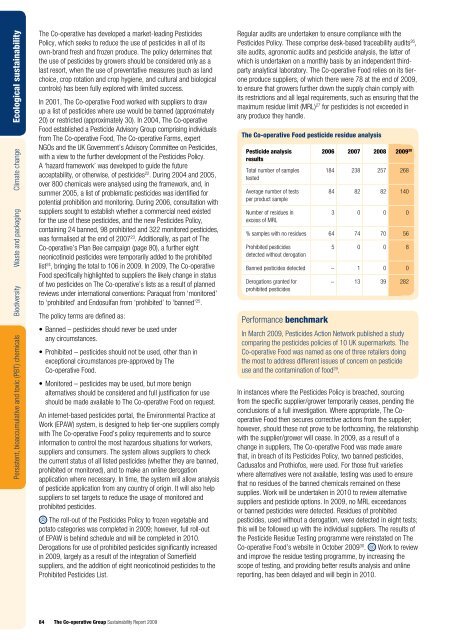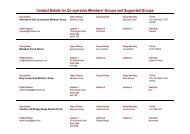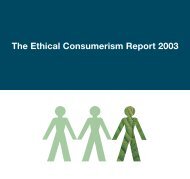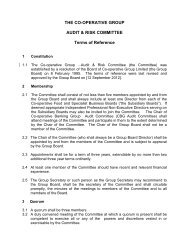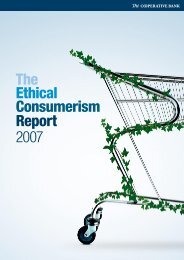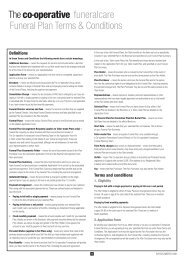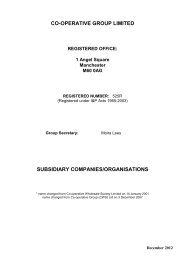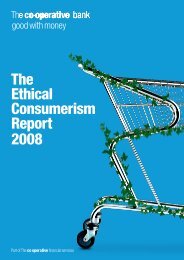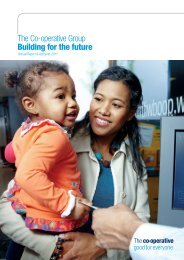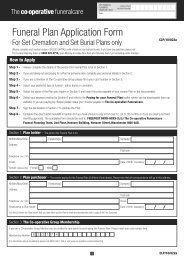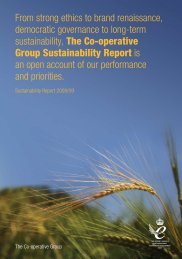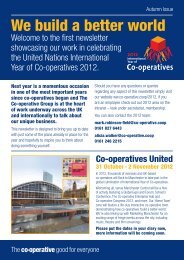Sustainability Report 2009 - The Co-operative
Sustainability Report 2009 - The Co-operative
Sustainability Report 2009 - The Co-operative
You also want an ePaper? Increase the reach of your titles
YUMPU automatically turns print PDFs into web optimized ePapers that Google loves.
Persistent, bioaccumulative and toxic (PBT) chemicals Biodiversity Waste and packaging Climate change Ecological sustainability<br />
<strong>The</strong> <strong>Co</strong>-<strong>operative</strong> has developed a market-leading Pesticides<br />
Policy, which seeks to reduce the use of pesticides in all of its<br />
own-brand fresh and frozen produce. <strong>The</strong> policy determines that<br />
the use of pesticides by growers should be considered only as a<br />
last resort, when the use of preventative measures (such as land<br />
choice, crop rotation and crop hygiene, and cultural and biological<br />
controls) has been fully explored with limited success.<br />
In 2001, <strong>The</strong> <strong>Co</strong>-<strong>operative</strong> Food worked with suppliers to draw<br />
up a list of pesticides where use would be banned (approximately<br />
20) or restricted (approximately 30). In 2004, <strong>The</strong> <strong>Co</strong>-<strong>operative</strong><br />
Food established a Pesticide Advisory Group comprising individuals<br />
from <strong>The</strong> <strong>Co</strong>-<strong>operative</strong> Food, <strong>The</strong> <strong>Co</strong>-<strong>operative</strong> Farms, expert<br />
NGOs and the UK Government’s Advisory <strong>Co</strong>mmittee on Pesticides,<br />
with a view to the further development of the Pesticides Policy.<br />
A ‘hazard framework’ was developed to guide the future<br />
acceptability, or otherwise, of pesticides 22 . During 2004 and 2005,<br />
over 800 chemicals were analysed using the framework, and, in<br />
summer 2005, a list of problematic pesticides was identified for<br />
potential prohibition and monitoring. During 2006, consultation with<br />
suppliers sought to establish whether a commercial need existed<br />
for the use of these pesticides, and the new Pesticides Policy,<br />
containing 24 banned, 98 prohibited and 322 monitored pesticides,<br />
was formalised at the end of 2007 23 . Additionally, as part of <strong>The</strong><br />
<strong>Co</strong>-<strong>operative</strong>’s Plan Bee campaign (page 80), a further eight<br />
neonicotinoid pesticides were temporarily added to the prohibited<br />
list 24 , bringing the total to 106 in <strong>2009</strong>. In <strong>2009</strong>, <strong>The</strong> <strong>Co</strong>-<strong>operative</strong><br />
Food specifically highlighted to suppliers the likely change in status<br />
of two pesticides on <strong>The</strong> <strong>Co</strong>-<strong>operative</strong>’s lists as a result of planned<br />
reviews under international conventions: Paraquat from ‘monitored’<br />
to ‘prohibited’ and Endosulfan from ‘prohibited’ to ‘banned’ 25 .<br />
<strong>The</strong> policy terms are defined as:<br />
• Banned – pesticides should never be used under<br />
any circumstances.<br />
• Prohibited – pesticides should not be used, other than in<br />
exceptional circumstances pre-approved by <strong>The</strong><br />
<strong>Co</strong>-<strong>operative</strong> Food.<br />
• Monitored – pesticides may be used, but more benign<br />
alternatives should be considered and full justification for use<br />
should be made available to <strong>The</strong> <strong>Co</strong>-<strong>operative</strong> Food on request.<br />
An internet-based pesticides portal, the Environmental Practice at<br />
Work (EPAW) system, is designed to help tier-one suppliers comply<br />
with <strong>The</strong> <strong>Co</strong>-<strong>operative</strong> Food’s policy requirements and to source<br />
information to control the most hazardous situations for workers,<br />
suppliers and consumers. <strong>The</strong> system allows suppliers to check<br />
the current status of all listed pesticides (whether they are banned,<br />
prohibited or monitored), and to make an online derogation<br />
application where necessary. In time, the system will allow analysis<br />
of pesticide application from any country of origin. It will also help<br />
suppliers to set targets to reduce the usage of monitored and<br />
prohibited pesticides.<br />
<strong>The</strong> roll-out of the Pesticides Policy to frozen vegetable and<br />
potato categories was completed in <strong>2009</strong>; however, full roll-out<br />
of EPAW is behind schedule and will be completed in 2010.<br />
Derogations for use of prohibited pesticides significantly increased<br />
in <strong>2009</strong>, largely as a result of the integration of Somerfield<br />
suppliers, and the addition of eight neonicotinoid pesticides to the<br />
Prohibited Pesticides List.<br />
Regular audits are undertaken to ensure compliance with the<br />
Pesticides Policy. <strong>The</strong>se comprise desk-based traceability audits 26 ,<br />
site audits, agronomic audits and pesticide analysis, the latter of<br />
which is undertaken on a monthly basis by an independent thirdparty<br />
analytical laboratory. <strong>The</strong> <strong>Co</strong>-<strong>operative</strong> Food relies on its tierone<br />
produce suppliers, of which there were 78 at the end of <strong>2009</strong>,<br />
to ensure that growers further down the supply chain comply with<br />
its restrictions and all legal requirements, such as ensuring that the<br />
maximum residue limit (MRL) 27 for pesticides is not exceeded in<br />
any produce they handle.<br />
<strong>The</strong> <strong>Co</strong>-<strong>operative</strong> Food pesticide residue analysis<br />
Pesticide analysis<br />
results<br />
Total number of samples<br />
tested<br />
Average number of tests<br />
per product sample<br />
Number of residues in<br />
excess of MRL<br />
2006 2007 2008 <strong>2009</strong> 28<br />
184 238 257 268<br />
84 82 82 140<br />
3 0 0 0<br />
% samples with no residues 64 74 70 56<br />
Prohibited pesticides<br />
detected without derogation<br />
5 0 0 8<br />
Banned pesticides detected − 1 0 0<br />
Derogations granted for<br />
prohibited pesticides<br />
Performance benchmark<br />
− 13 39 282<br />
In March <strong>2009</strong>, Pesticides Action Network published a study<br />
comparing the pesticides policies of 10 UK supermarkets. <strong>The</strong><br />
<strong>Co</strong>-<strong>operative</strong> Food was named as one of three retailers doing<br />
the most to address different issues of concern on pesticide<br />
use and the contamination of food 29 .<br />
In instances where the Pesticides Policy is breached, sourcing<br />
from the specific supplier/grower temporarily ceases, pending the<br />
conclusions of a full investigation. Where appropriate, <strong>The</strong> <strong>Co</strong><strong>operative</strong><br />
Food then secures corrective actions from the supplier;<br />
however, should these not prove to be forthcoming, the relationship<br />
with the supplier/grower will cease. In <strong>2009</strong>, as a result of a<br />
change in suppliers, <strong>The</strong> <strong>Co</strong>-<strong>operative</strong> Food was made aware<br />
that, in breach of its Pesticides Policy, two banned pesticides,<br />
Cadusafos and Prothiofos, were used. For those fruit varieties<br />
where alternatives were not available, testing was used to ensure<br />
that no residues of the banned chemicals remained on these<br />
supplies. Work will be undertaken in 2010 to review alternative<br />
suppliers and pesticide options. In <strong>2009</strong>, no MRL exceedances<br />
or banned pesticides were detected. Residues of prohibited<br />
pesticides, used without a derogation, were detected in eight tests;<br />
this will be followed up with the individual suppliers. <strong>The</strong> results of<br />
the Pesticide Residue Testing programme were reinstated on <strong>The</strong><br />
<strong>Co</strong>-<strong>operative</strong> Food’s website in October <strong>2009</strong> 30 . Work to review<br />
and improve the residue testing programme, by increasing the<br />
scope of testing, and providing better results analysis and online<br />
reporting, has been delayed and will begin in 2010.<br />
84<br />
<strong>The</strong> <strong>Co</strong>-<strong>operative</strong> Group <strong>Sustainability</strong> <strong>Report</strong> <strong>2009</strong>


